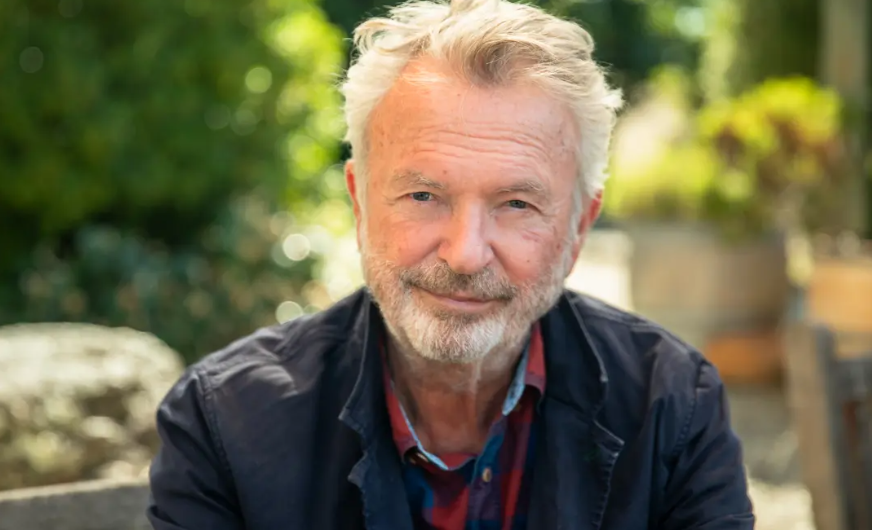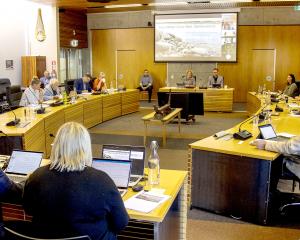For Sam Neill, it’s never been about Hollywood glitz or chasing stardom. It’s about the work, the land, and the people he shares it with.
The iconic actor invites RNZ's Guyon Espiner to his Two Paddocks vineyard in Central Otago for a rare and intimate discussion in this week’s episode of 30 With Guyon Espiner.
At Two Paddocks, his vineyard in Central Otago, Sam Neill is cultivating more than just grapes. The actor, writer, and reluctant celebrity has spent 25 years turning this quiet green haven into something deeply personal - a place of reflection, renewal, and, above all, community.
“All these native trees behind you, for instance, that's one of the things that we do here. I plant them, not just for me, but for the birds. There was never a native bird to be found in this valley before these trees started to come back.”
For Neill, 78, Two Paddocks isn’t just about wine; it’s about legacy. “There’s no money in wine,” he says.
“But having said that, Two Paddocks has become this very recognised and, I think, successful brand around the world. And at such a time as I shuffle off, I’d like to think that’s my legacy, as much as empathy.”

'They didn’t want a bar of me'
It’s a legacy that might never have existed if life had gone a different way. Neill didn’t set out to be an actor. In fact, he originally wanted to be a journalist, applying twice to TVNZ for jobs as a reporter and an editor.
“They didn’t want a bar of me,” he laughs. “And so they sort of saved me, in a sense.”
Instead, he wandered into acting - a career that would take him from New Zealand’s early film industry to Hollywood and back again.
That career has been nothing short of remarkable, spanning over five decades and a staggering range of roles. From his early days in New Zealand cinema with Sleeping Dogs (1977), which put him on the map, to his first taste of international stardom with Omen III: The Final Conflict (1981), he quickly became a sought-after leading man.
He dabbled with espionage in Reilly, Ace of Spies (1983), psycho-thriller with Dead Calm (1989) and in the same year - 1993 - cemented himself in pop culture in Steven Spielberg’s Jurassic Park, and arthouse cinema in Jane Campion’s The Piano.
And yet, despite a career spanning decades, Neill is insistent that fame never really changed him. “I don’t think [Jurassic Park] changed my life a great deal,” he says.
“As a matter of fact, I just kept pottering along. Some years are better than others. But it didn’t turn me into Tom Cruise or something.”
Maybe this is why, despite his status, Neill remains refreshingly unbothered by the trappings of celebrity.
“I’m not a celebrity. Being a celebrity is actually a serious job. I don’t have a publicist. I don’t do any of those things that you need to be a celebrity. I do a little bit of social media just for fun. I do silly things, just to make people smile a bit.”

“I feel sorry for him, because everyone wants to see Brad, and I know when he walks down the main street in Arrowtown, he will be mobbed. No one gives a stuff if I’m there! It’s great.”
Despite his reluctance to embrace celebrity, Neill has earned immense respect from his peers. The late, great screenwriter Dennis Potter once called him the most underrated actor in the world - a sentiment echoed by critics who have long admired his quiet gravitas and versatility. Meryl Streep, his co-star in Plenty (1985) declared him “the best kisser” in movies.
“I’ll take both!” he laughs.
'The director said to me, ‘America is finished.'
Neill has never been enamoured with Hollywood, despite his success there.
“I [lived in the USA] for a year-and-a-half,” he recalls. “We rented a house up the top of the [Hollywood] hills, and it was beautiful. But just after we left, they had the earthquakes and the riots, we could see fires on the other side of town. It’s not a happy place, America. And I wasn’t happy there.”
He is especially pessimistic about the state of the country today.
“It beggars belief what’s happening there now, but you sort of understand it,” he says, recounting a moment in West Virginia while filming Sally Hemmings: An American Scandal (2000).
“The director, Charlie Haid, said to me: ‘America is finished.’ He took me down the main street of this beautiful little town - picture postcard perfect - but all boarded up. He said, ‘Look at that. There’s nothing open here. No barber, no bar, nothing. No one goes to this church. This is what life’s become in North America.’”
That sense of lost community is what Neill yearns for the most.
“I think America’s heyday was probably in the 1950s when there was still community, when the barber was still open, and people drove great cars with fins, and there was jazz in Harlem. And what a wonderful place it was. And perhaps I’m just fantasising, but that’s how I see it.”
Online bullying of Ardern 'shameful'
Neill has strong opinions on leadership, particularly in New Zealand, praising Dame Jacinda Ardern’s time as Prime Minister.
“A lot of the online bullying and threats that were made against her, I think that’s completely shameful,” he says.
“I think she was a great Prime Minister and she showed wonderful leadership through those times. And this place opened up before anyone. I was amazed. I was doing a job in tight lockdown in England, and I came back and… people were partying up and down the streets in Auckland. That wasn’t happening anywhere in the world.”
His admiration for female leaders extends beyond New Zealand.
“I think if I had my way, I’d have women running everything now,” he says.
“Look at all the places that are in trouble at the moment - Sudan, Ukraine, the United States of America, the Middle East, of course. Who’s in charge in these places? Toxic males. Toxic masculinity is everywhere now. The Ukraine war would never have happened if Putin was actually Mrs Putin.”
'You’re never entirely sure what happens next'
For all his observations on politics, film, and fame, Neill remains, at heart, a man content with his lot in life. His routine at Two Paddocks is simple: planting trees, a mid-morning coffee, and occasionally making promises to himself that he’ll go to the gym (even if he doesn’t always keep them).
“I’ve got no fear of dying, at all,” he says, when asked about his recent battle with cancer - now in remission, “but you’re never entirely sure what happens next, and there’s no guarantees.”
“I know people for whom this is a great fear, but it doesn’t worry me at all. I just want to live longer, because life’s good, and I feel very blessed with the life I’ve had. I’ve sort of rambled between things, just sort of muddled along, but most of it’s been a great pleasure.”
And despite his talk of slowing down, Sam Neill in the year 2025 seems as busy as ever.
“I think I’m going to do a film on the Gold Coast, just for a few days in April,” he says.














